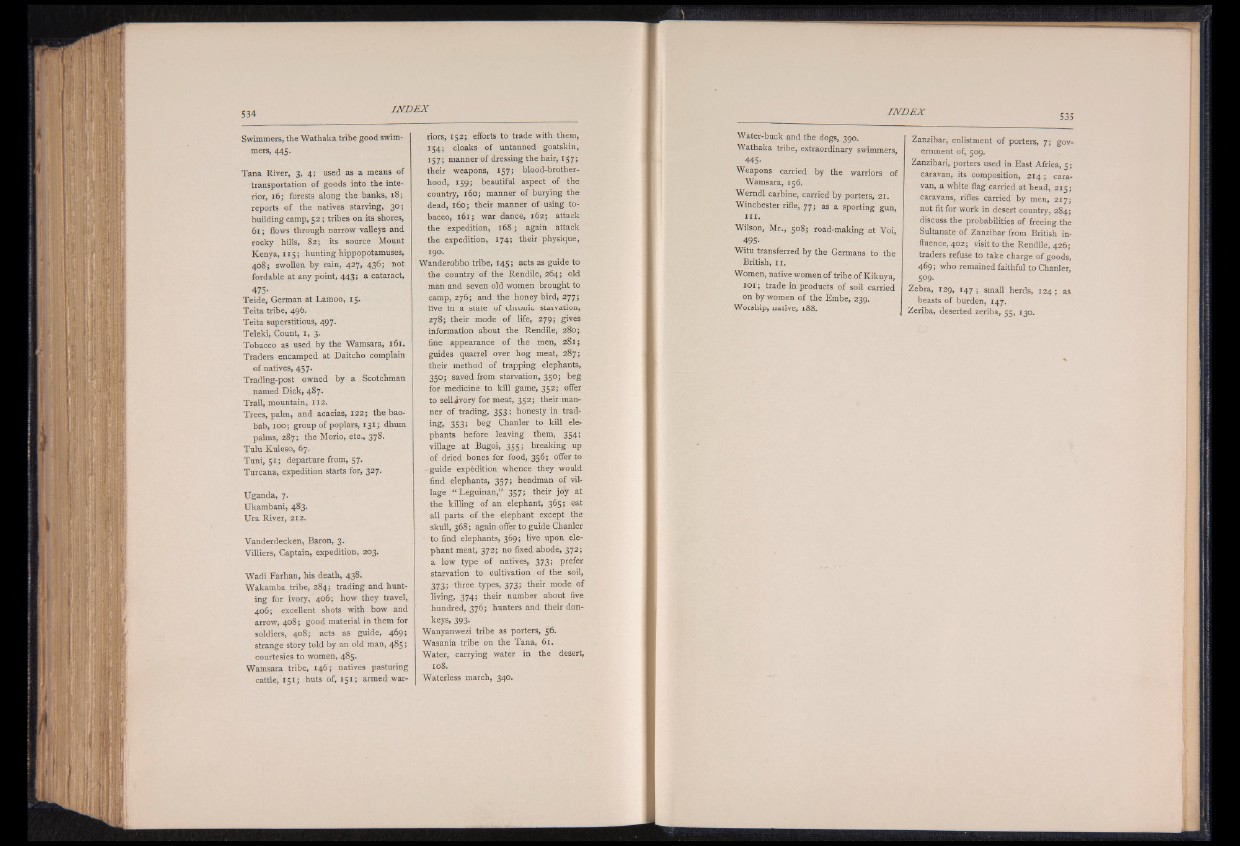
Swimmers, the Wathaka tribe good swimmers,
445.
Tana River, 3, 4; used as a means of
transportation of goods into the interior,
16; forests along the banks, 18;
reports of the natives starving, 30;
building camp, 52; tribes on its shores,
61; flows through narrow valleys and
rocky hills, 82; its source Mount
Kenya, 115; hunting hippopotamuses,
408; swollen by rain, 427, 436; not
fordable at any point, 443; a cataract,
475-
Teide, German at Lamoo, 15.
Teita tribe, 496.
Teita superstitious, 497.
Teleki, Count, 1, 3*
Tobacco as used by the Wamsara, 161.
Traders encamped at Daitcho complain
of natives, 457.
Trading-post owned by a Scotchman
named Dick, 487.
Trail, mountain, 112.
Trees, palm, and acacias, 122; the baobab,
100; group of poplars, 131; dhum
palms, 287; the Morio, etc., 378.
Tulu Kuleso, 67.
Tuni, 51; departure from, 57.
Turcana, expedition starts for, 327.
Uganda, 7.
Ukambani, 483.
Ura River, 212.
Vanderdecken, Baron, 3.
Villiers, Captain, expedition, 203.
Wadi Farhan, his death, 438.
Wakamba tribe, 284; trading and hunting
for ivory, 406; how they travel,
406; excellent shots with bow and
arrow, 408; good material in them for
soldiers, 408; acts as guide, 469;
strange story told by an old man, 485;
courtesies to women, 485.
Wamsara tribe, 146; natives pasturing
cattle, 151; huts of, 151; armed warriors,
152; efforts to trade with them,
154; cloaks of untanned goatskin,
157; manner of dressing the hair, 157;
their weapons, 157; blood-brother-
hood, 159; beautiful aspect of the
country, 160; manner of burying the
dead, 160; their manner of using tobacco,
161 ; war dance, 162; attack
the expedition, 168 ; again attack
the expedition, 174; their physique,
190.
Wanderobbo tribe, 145; acts as guide to
the country of the Rendile, 264; old
man and seven old women brought to
camp, 276; and the honey bird, 277;
live in a state of chronic starvation,
278; their mode of life, 279; gives
information about the Rendile, 280;
fine appearance of the men, 281;
guides quarrel over hog meat, 287;
their method of trapping elephants,
350; saved from starvation, 350; beg
for medicine to kill game, 352; offer
to sell^vory for meat, 352; their manner
of trading, 353 ; honesty in trading,
353; beg Chanler to kill elephants
before leaving them, 354;
village at Bugoi, 355; breaking up
of dried bones for food, 356; offer to
-guide expédition whence they would
find elephants, 357; headman of village
“ Leguinan,” 357; their joy at
the killing of an elephant, 365; eat
all parts of the elephant except the
skull, 368; again offer to guide Chanler
; to find elephants, 369; live upon elephant
meat, 372; no fixed abode, 372;
a low type of natives, 373; prefer
starvation to cultivation of the soil,
373; three types, 373; their mode of
living, 374; their number about five
hundred, 376; hunters and their donkeys,
393.
Wanyanwezi tribe as porters, 56.
Wasania tribe on the Tana, 61.
Water, carrying water in the desert,
108.
Waterless march, 340.
Water-buck and the dogs, 390.
Wathaka tribe, extraordinary swimmers,
445-
Weapons carried by the warriors of
Wamsara, 156.
Werndl carbine, carried by porters, 21.
Winchester rifle, 77; as a sporting gun,
i n .
Wilson, Mr., 5° 8; road-making at Voi,
495-
Witu transferred by the Germans to the
British, 11.
Women, native women of tribe of Kikuyu,
101; trade in products of soil carried
on by women of the Embe, 239.
Worship, native, 188.
Zanzibar, enlistment of porters, 7; government
of, 509.
Zanzibari, porters used in East Africa, 5;
caravan, its composition, 214; caravan,
a white flag carried at head, 215;
caravans, rifles carried by men, 217;
not fit for work in desert country, 284;
discuss the probabilities of freeing the
Sultanate of Zanzibar from British influence,
402; visit to the Rendile, 426;
traders refuse to take charge of goods,
469; who remained faithful to Chanler,
509-
Zebra, 129, 147 ; small herds, 124; as
beasts of burden, 147.
Zeriba, deserted zeriba, 55, 130.